|
|
|
Sort Order |
|
|
|
Items / Page
|
|
|
|
|
|
|
| Srl | Item |
| 1 |
ID:
163231
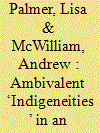

|
|
|
|
|
| Summary/Abstract |
Successfully achieving nationhood under the banner of what Anderson (2003) terms ‘aggregated nativeness’, Timor‐Leste is southeast Asia's newest nation. Yet as Anderson asserts ‘for the culture of nationalism … survival cannot be enough’ (2003: 184) and as with all other nationalisms, Timor‐Leste's nation‐making agenda is now engaged in the search for inclusive futures for its citizens. In this paper, we examine the extent to which Timor‐Leste's independence trajectory has included the active involvement of Indigenous Timorese traditions, practices and priorities in the governance of the new nation. By theorising these shifting ‘Indigenous’ ontologies and examining the ways in which they correspond (or not) with the tensions evident in more internationalised approaches to Indigeneity, we illuminate the socio‐political challenge of carving out spaces for plural identities and meaningfully diverse economic futures in Timor‐Leste. We argue that the term ‘Indigenous’ is not (yet) a term mobilised as a vehicle for the politics of recognition at either national or local levels of civil society.
|
|
|
|
|
|
|
|
|
|
|
|
|
|
|
|
| 2 |
ID:
074530
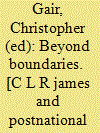

|
|
|
|
|
| Publication |
London, Pluto Press, 2006.
|
| Description |
202p.Pbk
|
| Standard Number |
0745323421
|
|
|
|
|
|
|
|
|
|
|
|
Copies: C:1/I:0,R:0,Q:0
Circulation
| Accession# | Call# | Current Location | Status | Policy | Location |
| 051845 | 813.52/JAM 051845 | Main | On Shelf | General | |
|
|
|
|
| 3 |
ID:
128146
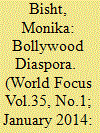

|
|
|
|
|
| Publication |
2014.
|
| Summary/Abstract |
The liberalization and the forces of globalization enhance the employment options, expansion of service sector and demand of skills across the borders. With this liberalization of the economy, a growing number of NRIs primarily from the United States and United Kingdom have also begun investing in their cultural homeland (Pulkit Datta: 2008). The aspiration of better lives and employment opportunities expanded the size of middle class abroad during 1990s, the terms "Non Resident Indian" emerged for the Indian who is living abroad. This is why; this period can be considered as the Golden Age of the NRI, which resulted the emerging middle class and the new material aspirations of an India in the midst of economic liberalization (Ingrid Thewath:2010).
|
|
|
|
|
|
|
|
|
|
|
|
|
|
|
|
| 4 |
ID:
086708
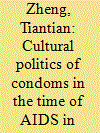

|
|
|
|
|
| Publication |
2009.
|
| Summary/Abstract |
Through an exploration of the lively debates between the state and the alliance of health realists and condom companies, this paper argues that unless the state takes a proactive stance on the marketing of condom use, the empowering and persuading effect that condom marketing should have upon the population will not be achieved. The impediment in this case, the state's position and attitude towards condoms, can only thwart the progressive cause of HIV prevention.
|
|
|
|
|
|
|
|
|
|
|
|
|
|
|
|
| 5 |
ID:
118422
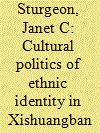

|
|
|
| 6 |
ID:
134183
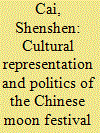

|
|
|
|
|
| Publication |
2014.
|
| Summary/Abstract |
Nationalism in various forms has been a fixture of modern Chinese politics and society; however, its form has changed and over the past decade or so, the CCP has begun to appropriate China's cultural nationalism through its extensive use of propaganda and by other less nefarious methods. This paradigm shift embodies the deliberate manoeuvring that state nationalism is exerting on cultural symbols, concepts and legacies in China. Through imagery and emotionally laden political marketing that favour Party policy and rule, this form of nationalism surreptitiously caters to the cultural tastes of, and appeals to, the emerging middle class of contemporary Chinese society. It is a more nuanced and creative type of propaganda. Using the 2009 China Central Television (CCTV) Moon Festival (Mid-Autumn Festival) Gala as a case study, this paper examines Party-state appropriations of cultural nationalism. The Gala is a rich reservoir of moon-inspired traditional Chinese cultural elements, and the intriguing manoeuvring of these culturally bound images and iconography signifies a new propaganda strategy that combines poetic nostalgia, poignant romance and abstract philosophical pursuit, through which cultural elements are skilfully woven into a patriotic and nationalist appeal. These traditional cultural signifiers, illusions and fantasies serve the Party's political aims as it attempt to reinforce its legitimacy by forging a culturally bound national identity.
|
|
|
|
|
|
|
|
|
|
|
|
|
|
|
|
| 7 |
ID:
139467
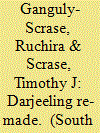

|
|
|
|
|
| Summary/Abstract |
Darjeeling today faces problems of congestion, pollution and loss of landscape aesthetics. Increased mobility and in-migration has created urban sprawl. Much of Darjeeling's architectural heritage has disappeared and many new constructions have come up to cater to the growing population, particularly the rising number of rural migrants who have been compelled to leave their homes due to diminishing rural employment. Based on ethnographic research and interviews with Darjeeling's residents, we examine the struggle for control over Darjeeling's fast-disappearing heritage, its loss of ‘charm’ as a tourist town, and its rapid transformation into a bustling, urban city reminiscent of many regional towns in India.
|
|
|
|
|
|
|
|
|
|
|
|
|
|
|
|
| 8 |
ID:
142829
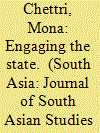

|
|
|
|
|
| Summary/Abstract |
In the eastern Himalayan borderland, state-led initiatives have led to the transformation of pre-existing patronage networks and placed ethnic identity at the core of regional politics. Based on ethnographic research in Sikkim, the paper illustrates the prolific rise of affirmative action politics and its relationship with ethnic identity, which has altered the social, political and religious landscape of Sikkim. The paper introduces a new approach to understanding borderlands as dynamic political spaces and contributes to a nuanced understanding of emerging forms of political agency and interaction on the peripheries of regional South Asia.
|
|
|
|
|
|
|
|
|
|
|
|
|
|
|
|
| 9 |
ID:
121772


|
|
|
|
|
| Publication |
2013.
|
| Summary/Abstract |
Reporting on the growth of volunteer tourism, a recent Time magazine article explains, 'Getting in touch with your inner Angelina Jolie is easier than it used to be!'. In myriad ways celebrities like Angelina Jolie and Madonna have made international volunteering sexy. These women and their adopted children from the so-called 'Third World' have come to symbolise popular humanitarianism in the West. This paper addresses the cultural politics of female celebrity humanitarianism and the corollary implications of this practice for 20-something female volunteer tourists in northern Thailand. Based on 16 months of ethnographic fieldwork, I argue that the cultural politics of gendered generosity in these encounters overshadows the institutional and historical relationships on which the experience is based and that, in a neoliberal sleight of hand, the political is displaced by the individual with celebrity sheen.
|
|
|
|
|
|
|
|
|
|
|
|
|
|
|
|
| 10 |
ID:
181137
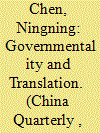

|
|
|
|
|
| Summary/Abstract |
This paper explores the cultural politics of lineage landscapes in contemporary rural China. Drawing on a combined governmentality/translation approach and ethnographic fieldwork in rural Wenzhou, it examines how the state governs the production of lineage landscapes and how local lineages translate governmental technologies in complex ways. Empirical evidence reveals that the government develops diversified rationalities and modes of governance to direct the (re)construction of lineage landscapes. It is also found that local lineages are skilled at appropriating state discourses and practices as well as enrolling other (non-)human actors, thereby legitimizing their landscape projects of ancestral tombs and memorials. On the ground, they often displace state objectives with the production of their preferred landscape (for example, “chair” tombs). Respectful of ancestors, state agents sometimes turn a blind eye to local displacement; however, while encountering challenges from the higher-level government, they intensify regulation, but lineages still retain the capacity to negotiate with them. With sensitivity to the entanglement of diversified actors and their dynamic interactions, this paper underlines the multiplicity and contingency of state governance and societal responses. It also foregrounds the cultural politics of lineage landscapes as a process of translating governmental technologies characterized by continuous mobilization, displacement and negotiation in a heterogeneous network.
|
|
|
|
|
|
|
|
|
|
|
|
|
|
|
|
| 11 |
ID:
116494
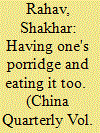

|
|
|
|
|
| Publication |
2012.
|
| Summary/Abstract |
This article examines the "porridge incident," in which the renowned Chinese author, critic and former minister of culture Wang Meng sued a Communist Party literary journal for attacking him and his story "Hard Porridge" ("Jianying de xizhou"). The incident straddled the transitional period between 1989 and 1992 and illuminates the ramifications of structural changes in China's literary sphere. I frame the affair within two contexts: Wang Meng's tortuous career, which challenges dichotomies of bureaucrat vs. dissident, and the transition from a centralized literary sphere to a market-driven one. I argue that Wang's responses to the attack on him stemmed from a political and cultural standing that was the product of a Party-controlled cultural sphere, along with the opportunities offered by expanding reforms. The Deng-era reforms produced a divide between culture, markets and bureaucracy that would preclude cultural figures like Wang from holding such high bureaucratic positions anymore.
|
|
|
|
|
|
|
|
|
|
|
|
|
|
|
|
| 12 |
ID:
094006


|
|
|
|
|
| Publication |
2010.
|
| Summary/Abstract |
Teaching heritage language is regarded as an act of social justice, but under what conditions and in what context? This article examines the educational practice of introducing heritage language to Chinese return-migrant children and Japan-born Vietnamese children. The language programs under investigation are conducted in a community education center and in an after-school setting in a public elementary school in a multiethnic neighborhood in Osaka, Japan. This study demonstrates how the local community's practice of heritage language learning dissolves the boundaries among ethnic minorities, bringing together all participants and cutting across ethnic lines. The result is empowering, but with a limited effect. At the same time, the institutionalized practice of heritage language learning at school becomes a marker for ethnic minorities and is used to maintain the boundary between ethnic minorities and Japanese, despite official discourses of minority education for empowerment. Ethnographic data show discrepancies between the views of teachers and communities about what ethnic minorities should be like and what they are hoping to find in Japan. The politics of heritage involves the legitimization of power and distinction, as well as the exclusion of those who do not have access to heritage. Situating each case within the politics of heritage, schooling, and Japan's multicultural initiatives, this article examines what is legitimized and what is excluded through teaching and learning heritage language in both cases and discusses the implications of heritage language teaching for immigrant children in Japan.
|
|
|
|
|
|
|
|
|
|
|
|
|
|
|
|
| 13 |
ID:
080815


|
|
|
|
|
| Publication |
2008.
|
| Summary/Abstract |
Resource conflicts often intensify ethnic violence and vice versa. However, in specific cases situations can be more complex than they appear. To understand this phenomenon, this chapter takes incidents of violence in Northern Thailand as a point of departure to explain how the historical construction of ethnic identification is tied to the spatial division of highlands and lowlands. I argue that these incidents of violence are not just about resource scarcity but also about notions of forests and highlands as places of wildness and lowlands as the source of civilisation. The current adoption of a nature conservation discourse among Thais puts forests and hills into a battlefield of perceived resource degradation. Some situations have been aggravated to the point that violence has been perpetuated against ethnic highlanders by lowlanders who have adopted orthodox science and nationalist sentiments drawn from a history and geography of ethnic identification. Taking a political ecology approach, this article highlights the interplay among resources, access rights, identity, history, polity, and space to unveil the complexity and specificity of ethnic violence
|
|
|
|
|
|
|
|
|
|
|
|
|
|
|
|
| 14 |
ID:
107566


|
|
|
|
|
| Publication |
2011.
|
| Summary/Abstract |
How should we understand the cultural politics that has surrounded the development of international human rights? Two perspectives frame contemporary debate. For 'cultural particularists', human rights are western artefacts; alien to other societies, and an inappropriate basis for international institutional development. For 'negotiated universalists', a widespread global consensus undergirds international human rights norms, with few states openly contesting their status as fundamental standards of political legitimacy. This article advances an alternative understanding, pursuing John Vincent's provocative, yet undeveloped, suggestion that while the notion of human rights has its origins in European culture, its spread internationally is best understood as the product of a 'universal social process'. The international politics of individual/human rights is located within an evolving global ecumene, a field of dynamic cultural engagement, characterized over time by the development of multiple modernities. Within this field, individual/human rights have been at the heart of diverse forms of historically transformative contentious politics, not the least being the struggles for imperial reform and change waged by subject peoples of diverse cultural backgrounds; struggles that not only played a key role in the construction of the contemporary global system of sovereign states, but also transformed the idea of 'human' rights itself. In developing this alternative understanding, the article advances a different understanding of the relation between power and human rights, one in which rights are seen as neither simple expressions of, or vehicles for, western domination, nor robbed of all power-political content by simple notions of negotiation or consensus. The article concludes by considering, in a very preliminary fashion, the implications of this new account for normative theorizing about human rights. If a prima facie case exists for the normative justifiability of such rights, it lies first in their radical nature-in their role in historically transformative contentious politics-and second in their universalizability, in the fact that one cannot plausibly claim them for oneself while denying them to others.
|
|
|
|
|
|
|
|
|
|
|
|
|
|
|
|
| 15 |
ID:
051137


|
|
|
|
|
| Publication |
Seattle, University of Washington Press, 2002.
|
| Description |
ix, 393p.pbk
|
| Standard Number |
0295982063
|
|
|
|
|
|
|
|
|
|
|
|
Copies: C:1/I:0,R:0,Q:0
Circulation
| Accession# | Call# | Current Location | Status | Policy | Location |
| 046509 | 955/KED 046509 | Main | On Shelf | General | |
|
|
|
|
| 16 |
ID:
095548
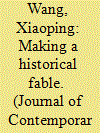

|
|
|
|
|
| Publication |
2010.
|
| Summary/Abstract |
The screening of the film Lust, Caution in China in late 2007 and the subsequent banning of its actress in early 2008 created a great stir, arousing heated debates across many ranks of society. The debates lasted for more than half a year, making it one of the most sensational cultural (and political) events in China of the year. As a result, the intricate texture of its cinematic text and the complex reactions of the social context constitute an intriguing case of sophisticated cultural politics with rich and significant import. Through an analysis of the film's narrative strategy, this paper reveals the film's nature as a political film noir aimed to allegorize the history of modern China. A discussion of its diversified reception in the Chinese world, rather than echoing the mainstream opinion that sees the harsh critique from the Chinese populace as merely a blind reaction of rampant nationalist sentiment, discloses the heterogeneous voices among differing social forces competing for cultural hegemony in contemporary China.
|
|
|
|
|
|
|
|
|
|
|
|
|
|
|
|
| 17 |
ID:
093966
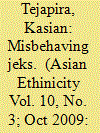

|
|
|
|
|
| Publication |
2009.
|
| Summary/Abstract |
This paper traces the evolving cultural-political regime based on the ethno-ideology of Thainess with which the Thai state controlled and contained the immigrant Chinese and their Thai-born descendants politically, and assimilated them culturally, while making use of their labour and entrepreneurship to develop Thai capitalism economically, through its absolutist, militarist and electocratic phases. It also sketches the challenges successively mounted to that regime by immigrant communists, radical democratic nationalists, and globalised capitalists, whose ethnic Chinese descent has yielded gradually over time to class and political identity in the context of successful cultural assimilation, changing international politics, growing wealth and economic crisis, coups, and political polarisation. Meanwhile, lurking in the background are the rural peasants and urban poor/marginalised population, whose majority vote and changing political loyalty may prove decisive in the outcome of the latest political contest.
|
|
|
|
|
|
|
|
|
|
|
|
|
|
|
|
| 18 |
ID:
151744
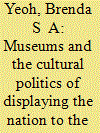

|
|
|
|
|
| Summary/Abstract |
Focusing on the way nationalist imperatives and cosmopolitan ambitions fold into each other in the making of museum spaces in seven cities across the globe, Artifacts and Allegiances provides an intriguing comparative narrative of museum practices which takes into account the broader differences in social, demographic and historical contexts. Based primarily on interviews with museum professionals, academics and policymakers, the approach favours the production of meanings and representations from above, as opposed to the telling of stories from below. A consideration of multiple readings, appropriations and contestations across different scales would afford us a more dynamic view of the cultural politics that animate the ways in which museums display the nation to the world and draw the world into the nation.
|
|
|
|
|
|
|
|
|
|
|
|
|
|
|
|
| 19 |
ID:
099450
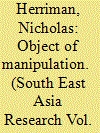

|
|
|
|
|
| Publication |
2010.
|
| Summary/Abstract |
Some of the most important contributors to the study of Indonesia have observed that the concept of 'rakyat' [the people] has been central to the way Indonesians understand their nation. 1 Yet until now there has been little attempt to consolidate and build on these observations by analysing the nuances and implications of understandings of the term 'rakyat'. In this paper, the author encourages the development of such research by critiquing its use in the period following the Second World War. The author analyses two key novels written by leading authors from opposing sides of a great cultural debate and shows that, regardless of the spiteful divide between left-wing and right-wing, the two authors viewed the rakyat as somewhat inferior. The rakyat was also seen as belonging to the village, but could transform into a violent yet manipulable throng in the city. Despite these pejorative implications, however, the rakyat was also key to the nation's aspirations. The author situates these developments in relation to a longer history of the term 'rakyat'.
|
|
|
|
|
|
|
|
|
|
|
|
|
|
|
|
| 20 |
ID:
051275
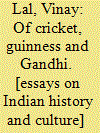

|
|
|
|
|
| Publication |
Calcutta, Seagull Books, 2003.
|
| Description |
xxiii, 223p.hbk
|
| Standard Number |
8170461847
|
|
|
|
|
|
|
|
|
|
|
|
Copies: C:1/I:0,R:0,Q:0
Circulation
| Accession# | Call# | Current Location | Status | Policy | Location |
| 048119 | 954/LAL 048119 | Main | On Shelf | General | |
|
|
|
|
|
|
|
|
|